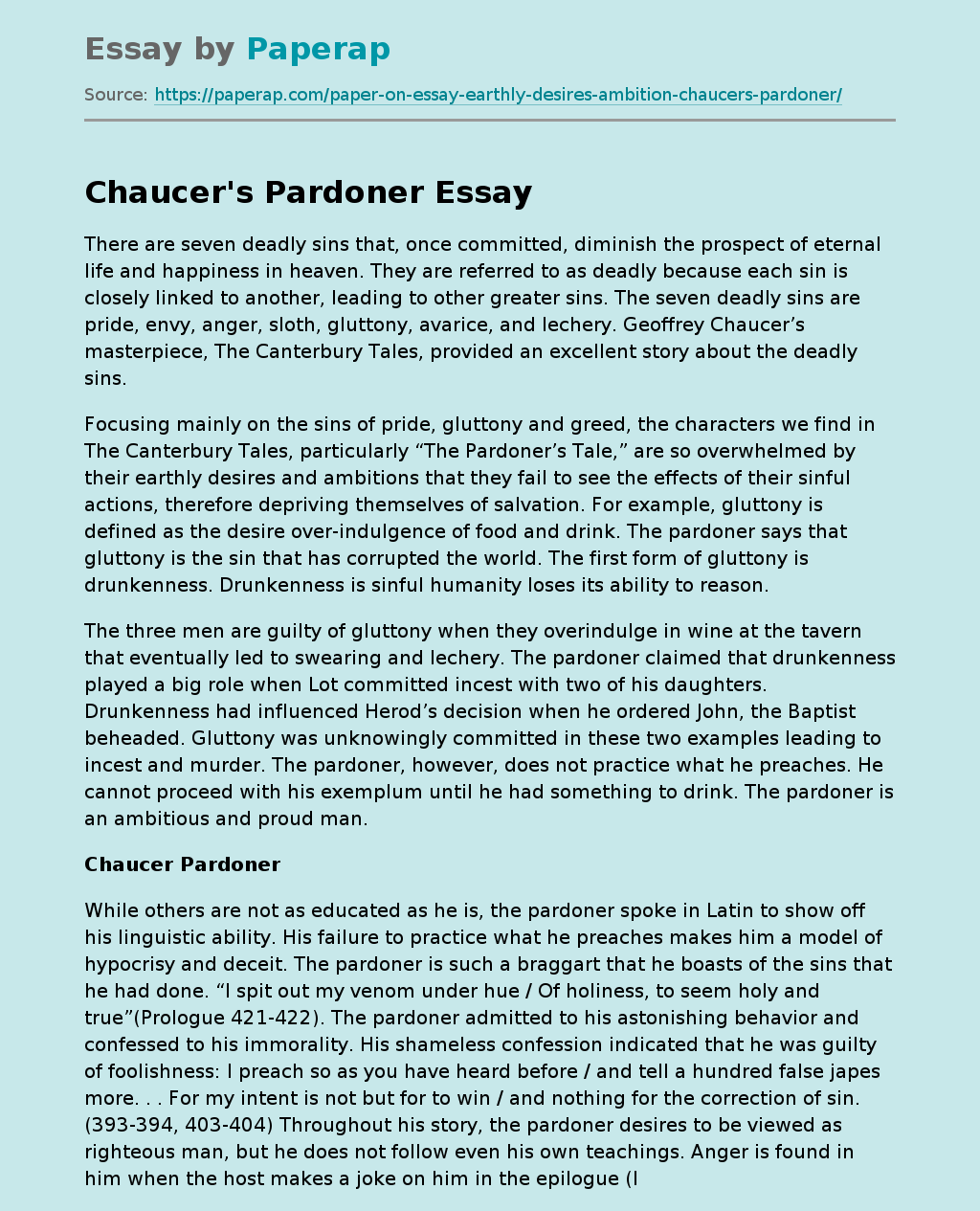"The Canterbury Tales"
The following example essay on “The Canterbury Tales” is an analysis of a literary work by Geoffrey Chaucer. The Canterbury Tales, provided an excellent story about the deadly sins.
There are seven deadly sins that, once committed, diminish the prospect of eternal life and happiness in heaven. They are referred to as deadly because each sin is closely linked to another, leading to other greater sins. The seven deadly sins are pride, envy, anger, sloth, gluttony, avarice, and lechery.
Focusing mainly on the sins of pride, gluttony and greed, the characters we find in The Canterbury Tales, particularly “The Pardoner’s Tale,” are so overwhelmed by their earthly desires and ambitions that they fail to see the effects of their sinful actions, therefore depriving themselves of salvation.
For example, gluttony is defined as the desire over-indulgence of food and drink. The pardoner says that gluttony is the sin that has corrupted the world. The first form of gluttony is drunkenness. Drunkenness is sinful humanity loses its ability to reason.
The three men are guilty of gluttony when they overindulge in wine at the tavern that eventually led to swearing and lechery. The pardoner claimed that drunkenness played a big role when Lot committed incest with two of his daughters. Drunkenness had influenced Herod’s decision when he ordered John, the Baptist beheaded. Gluttony was unknowingly committed in these two examples leading to incest and murder. The pardoner, however, does not practice what he preaches. He cannot proceed with his exemplum until he had something to drink.
The pardoner is an ambitious and proud man.
While others are not as educated as he is, the pardoner spoke in Latin to show off his linguistic ability. His failure to practice what he preaches makes him a model of hypocrisy and deceit. The pardoner is such a braggart that he boasts of the sins that he had done. “I spit out my venom under hue / Of holiness, to seem holy and true”(Prologue 421-422). The pardoner admitted to his astonishing behavior and confessed to his immorality. His shameless confession indicated that he was guilty of foolishness: I preach so as you have heard before / and tell a hundred false japes more. . . For my intent is not but for to win / and nothing for the correction of sin. (393-394, 403-404)
Throughout his story, the pardoner desires to be viewed as righteous man, but he does not follow even his own teachings. Anger is found in him when the host makes a joke on him in the epilogue (Introduction 287-328). Also found in the pardoner is slothfulness. The pardoner displays no desire to work with his own hands. He admits his distaste for poverty and expresses his preference to live in luxury (Prologue 440-449). An arrogant attitude is a barrier in achieving a genuine and honest relationship between people.
In fact, pride drives others to commit the sins of envy. Chaucer illustrates ambition in the “Pardoner’s Tale. ” “Radix malorum est cupiditas”— The love of money is the root of all evil (Prologue 334). The three men became avaricious and lecherous when they find eight bushels of gold under an oak tree. As a result, two men decide to plot a murder against the other man who goes to town to get food and drink. However, they are unaware that he has evil intentions of his own. He purchases three bottles of wine and pours rat poison into two of them for the other two men.
When he returns to the oak tree, the two men stab him to death. Unaware that the wine has been tainted with poison, the two men drink the poisoned wine and die as well (Pardoner’s Tale 768-894). The sins of greed and lust lead to evil. The three men were so concerned with their earthly desires for wealth and envious of each other that they failed to “see” death. The characters we find in The Pardoner’s Tale are so concerned with their earthly desires and possessions that they failed to acknowledge the existence of the afterlife.
They are oblivious to the fact that sin determines their ultimate destiny. The Pardoner’s Tale is a direct extension of the personality of the narrator. It is a shameless tale, a criticism of greed that comes from the greediness of its narrator; by rebuking sin, the Pardoner hopes to motivate the travelers to pay the Pardoner to forgive their sins. The character of the Pardoner is omni-present throughout the tale. Throughout the tale the narrator drifts in and out from the story, as the Pardoner occasionally leaves the plot of the tale to launch into sermons against sin.
Finally, at the conclusion of the tale, he reveals the justification for his intervening, preaching against avarice for the sole intention of selling phony relics to the travelers.
"The Canterbury Tales". (2019, Dec 05). Retrieved from https://paperap.com/paper-on-essay-earthly-desires-ambition-chaucers-pardoner/

